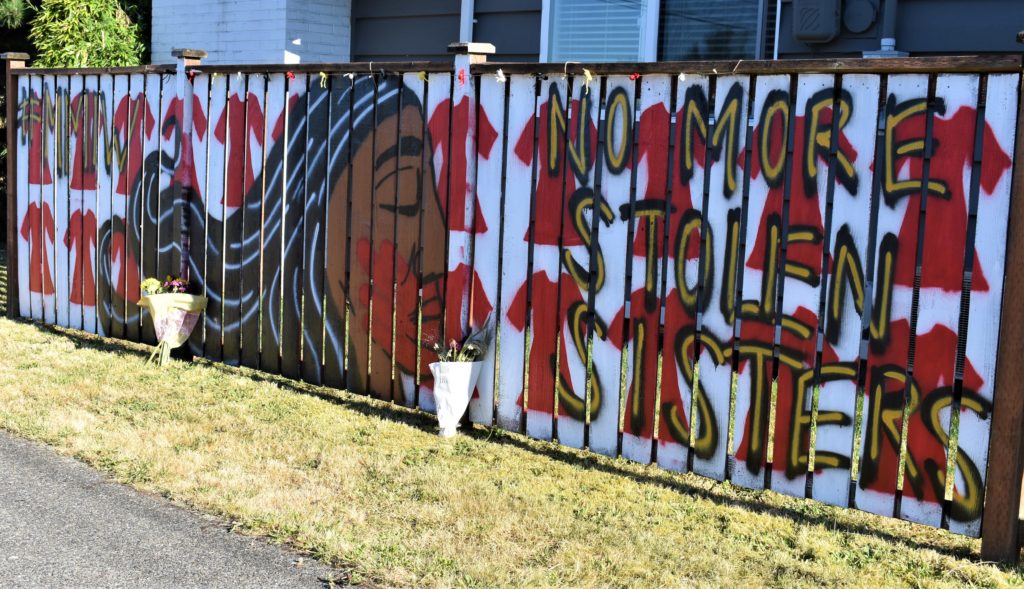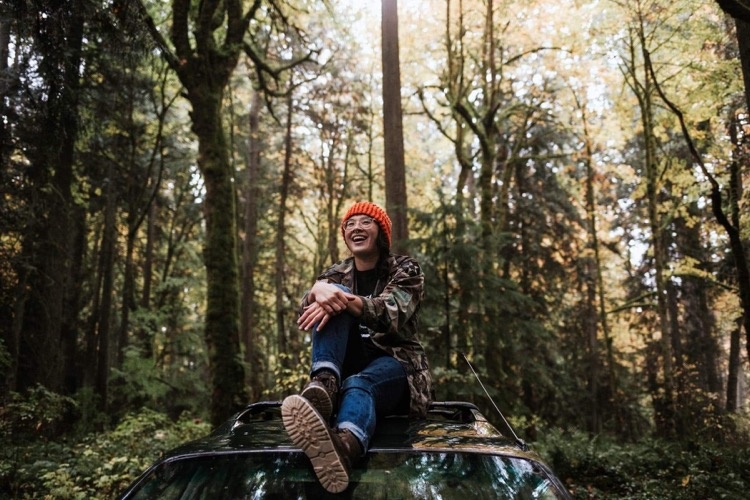Photos and story by Lisa Pemberton, Puyallup Tribal News Editor
Puyallup Tribal Member Jennifer Vasilez envisioned a mural that would make a statement, and draw attention to the Missing and Murdered Indigenous Women (MMIW) epidemic.

She wasn’t expecting the mural at her Tacoma home along North 30th Street, a few blocks west of North Orchard Street, to become a memorial for those who have been affected by MMIW. But in many ways, that’s what it has become.
Vasilez said she’s grateful to host the mural, raise awareness and help families who have been affected by MMIW. She’s fielded numerous questions about the mural. Passing by motorists honk their horns in support. Sometimes, people pose for photos by the mural. One man asked if he could pray next to it, and he left a chain of colorful tobacco prayer ties along the fence.
“Flowers started arriving last weekend – I thought that was really great,” Vasilez said in late July, shortly after the mural was painted. “It’s another way you can see it’s impacted people. These women are our mothers, daughters, sisters, aunties, and they are valuable people.”
Vasilez is one of the new secondary principals at Chief Leschi Schools, and formerly served on the City of Tacoma’s Human Rights Commission. She said she wanted a mural that would make a political statement, and was inspired by the MMIW advocacy work that’s been done by Puyallup Tribal member Carolyn DeFord and Cowlitz Tribal member Rosalie Fish.
The spray-painted mural features red dresses, a red hand painted across an Indigenous face and the words “No More Stolen Sisters.” Artist Alexandria Barclay of Olympia created it.

The two worked together at Chief Leschi a few years ago.
Barclay now works for a crisis center, a job that has put her on the front lines of human trafficking, which is linked to MMIW.
“It’s hard not to get emotional about those things because then you realize that your art is like a visual memorial of where people can go and they can have the space to go process the grief and emotions,” Barclay said. “I didn’t know it was going to become that, but I’m really glad that it is and that people are able to use that space as they need to.”
DeFord, Human Trafficking Project Coordinator for the Tribe, described the mural as healing, and said it can help families know that MMIW victims are not forgotten – even after the police have stopped searching, or a case has gone cold.
“Seeing anonymous and voluntary community interaction with it just goes to show how this issue has touched so many of us,” she said.
DeFord said the mural can also help spread the message that MMIW is a preventable issue that is an outcome of colonization and historical trauma.
According to the Department of Justice, 55 percent of Native American women have experienced physical violence with an intimate partner. Washington is the second highest in the nation for missing indigenous cases in urban centers.
“As a community we can recognize the signs and do bystander intervention,” DeFord added. “It’s preventable, and we have the tools within our own community to heal ourselves.”
The Tribe’s Community Domestic Violence Advocacy Program provides support to families and survivors of domestic violence, and human trafficking. CDVAP’s 24-hour hotline is 253-680-5499.




